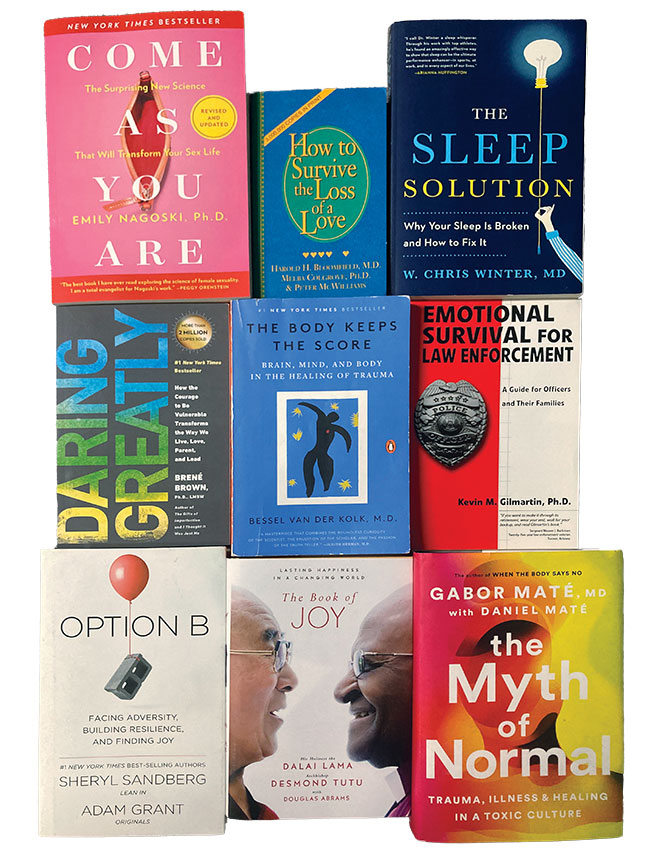
Features
Expanding the firehall library
Noteworthy reads on need to know topics
March 29, 2024
By David Moseley
 Recently we decided to expand our firehall library in a couple of directions beyond the traditional technical books to include resources on mental health and the Truth and Reconciliation Commission’s Call to Action 57.
PHOTO: David Moseley
Recently we decided to expand our firehall library in a couple of directions beyond the traditional technical books to include resources on mental health and the Truth and Reconciliation Commission’s Call to Action 57.
PHOTO: David Moseley While many people now turn to podcasts and social media, books remain powerful tools for developing ourselves and our members. Recently we expanded our firehall library beyond the traditional technical books to include resources on mental health and the Truth and Reconciliation Commission’s Call to Action 57.
There are many ways to promote and support the mental health of firefighters. One easy inexpensive way is to develop a mental health library. While some may be dismissive of “self-help” books, we encourage a more open-minded approach to what some mental health professionals refer to as “psychoeducation”. In a broad sense, many books deal with well-being, such as those by Brené Brown, or The Book of Joy by the Dali Lama and Desmond Tutu. Some may be more specific, and a popular topic is trauma. What Happened to You by Bruce Perry and Oprah Winfrey, and Trauma the Invisible Epidemic by Paul Conti are two books I found easy to read. While more challenging reads, The Body Keeps the Score by Bessel Van Der Kolk and The Myth of Normal by Gabor Maté and Daniel Maté, are excellent books addressing trauma. Two worthwhile books that address dealing with adversity are Option B by Sheryl Sandberg and Adam Grant, and When Things Fall Apart by Pema Chodron. Some less obvious topics related to mental health are sexuality and sleep. Come as You Are by Emily Nagoski explores sexuality and in the process dispels some myths. The Sleep Solution by Chris Winter is, somewhat surprisingly, the most popular book in our firehall library.
There is an obvious link between mental health, trauma, and our relationship with Indigenous people in Canada. To improve this relationship, the Truth and Reconciliation Commission produced 94 Calls to Action. Call to Action 57 reads: “We call upon federal, provincial, territorial, and municipal governments to provide education to public servants on the history of Aboriginal peoples, including the history and legacy of residential schools, the United Nations Declaration on the Rights of Indigenous Peoples, Treaties and Aboriginal rights, Indigenous law, and Aboriginal-Crown relations. This will require skills-based training in intercultural competency, conflict resolution, human rights, and anti-racism.”
Reading is a key way to better understand the truth of colonization in Canada, and without truth there can be no reconciliation. This reading can be very uncomfortable at times. It is not enjoyable to feel anger directed at you as a white settler, or to read graphic accounts of the rape of children. In facing the truth, we can expect some discomfort. Despite the heaviness of the subjects addressed, there is no shortage of humour on hand. The books of Richard Wagamese (One Indian Life, for example) and Thomas King (The Inconvenient Indian) alone could probably fill your library. Other authors include Dawn Dumont (Nobody Cries at Bingo and Glass Beads), Michelle Good (Five Little Indians), Tanya Talaga (Seven Fallen Feathers and All Our Relations), Wab Kinew (The Reason You Walk), and many more. There are two books I found particularly impactful that are under 200 pages: 21 Things You May Not Know About the Indian Act by Bob Joseph struck me as an objective book that deals that sets the context and help to dispel some myths. My Decade at Old Sun, My Lifetime of Hell by Arthur Bear Chief is a heart wrenching personal account of the abuse experienced at a residential school and its resulting lifelong impact. An awful and yet wonderful read, Bear Chief demonstrates incredible courage and resiliency. These two books combined speak effectively to our minds and our hearts. In addition to these books, there is the Calls to Action booklet of the Truth and Reconciliation Commission.
Both the subject matter and specific books listed here are just suggestions, they are in no way comprehensive or complete. Additional reading recommendations are welcome. While reading alone is not enough to achieve robust mental health or truth and reconciliation in Canada, it can provide a positive, achievable step in those directions.
David Moseley is a forest officer with the Government of Alberta, and officer with Lac La Biche County Fire Rescue in Alberta, focused on operations. His other areas of interest include instructing, CISM and wildfire investigation. Contact him at david.moseley@gov.ab.ca.
Print this page